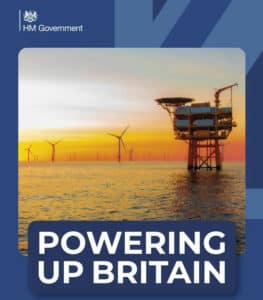A new report by Government Report titled “Powering Up Britain: Joint Overview” has outlined a roadmap to achieving carbon-neutral energy in the UK. The report, which was developed in collaboration with industry experts, outlines the necessary steps that need to be taken to transition the country to a low-carbon energy system.
The report proposes a combination of renewable energy sources such as wind, solar, and biomass, as well as a significant increase in energy efficiency measures. The authors of the report believe that this combination of measures could reduce the UK’s carbon emissions to net-zero by 2050.
According to the report, the UK currently relies heavily on fossil fuels, but over the past decade has been making good progress with the transition to cleaner energy. Between 1990 and 2021 emissions have been cut by 48%. The report sets out how the government will continue this transition and “enhance our country’s energy security, seize the economic opportunities of the transition, and deliver on our net zero commitments.” The authors argue that is essential if the UK is to meet its ambitious carbon-neutral targets. The report calls for a significant increase in the use of renewable energy sources, with a particular focus on biomass, which the authors believe has the potential to play a major role in the UK’s energy mix.
The report also calls for the development of new energy storage technologies to address the intermittent nature of renewable energy sources. This includes the use of battery storage, hydrogen, and other innovative solutions.
The authors of the report acknowledge that achieving carbon-neutral energy in the UK will require significant investment and a coordinated effort from both the public and private sectors. However, they argue that the benefits of a low-carbon energy system, including cleaner air, improved public health, and greater energy security, will outweigh the costs in the long run.
The report has been welcomed by environmental groups and energy experts, who see it as an important step towards a sustainable future for the UK. However, some critics have raised concerns about the feasibility and cost of implementing the proposals outlined in the report.
Biomass Connect Advisory Board member and leading biomass Scientist Patricia Thornley from Aston University has welcomed the government’s plans but feels they should be exploring Biomass Energy with Carbon Capture and Storage (BECCS) too. In a post reacting to the report she says:
“Bioenergy is delivering carbon reductions around the UK today – 62% of our renewable energy and around 13% of our electricity comes from biomass – and developing sustainable biomass conversion with carbon capture and storage (BECCS) would be a natural progression for the UK. So it is good to see commitment to BECCS, but to fully leverage the UK’s negative emission potential we need BECCS technology to be rapidly deployed.”
Overall, the report provides a comprehensive overview of the steps needed to achieve carbon-neutral energy in the UK and is likely to be an important reference point for policymakers and industry leaders in the years to come.




